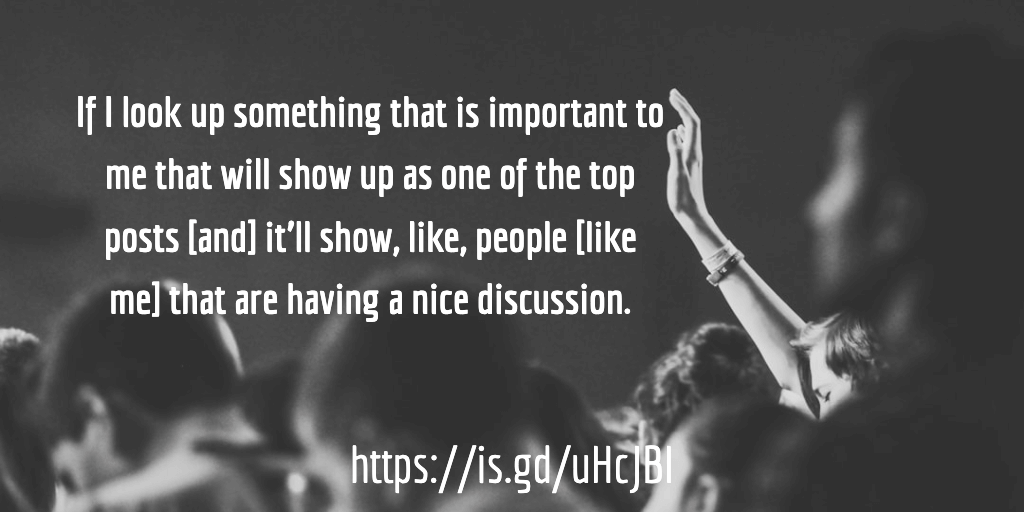I don’t understand the image quote above out of context. So, what is the context summed up.
Teens enjoy how social media algorithms show them content that feels personalized and reflects who they are. The algorithms use phrases like “for you” to suggest that the content is not just for them but also about them, like a mirror showing their interests and identity. Researchers have found that teens, who are still forming their identities, are heavily influenced by these algorithms. The study showed that teens appreciate seeing content that aligns with their preferences and beliefs, making them feel understood and validated. They tend to ignore or scroll past content that doesn’t match their self-image, viewing it as a mistake or glitch.
If you prefer this as a question or even a research question try this on: what is it like to grow up in an algorithmically mediated world?
The researchers noted that if content doesn’t fit a teen’s self-perceived identity it is seen as an anomaly, a glitch. In other words the algorithm rules in the quest for identity. Teens not only view the algorithm’s decision as accurate; they also do not reflect on “for you”s that don’t fit.
And what of the unforeseen consequences:
– Algorithms that mirror users’ own identities and behaviors on social media platforms could reinforce existing biases and limit exposure to diverse perspectives, potentially exacerbating social divisions. This is the same conclusion that Eli Pariser came to in his research into “filter bubbles” [1].
Based on the search results, here are some key unintended consequences to teen identity that can arise from social media “for you” recommender algorithms:
– Algorithms that mirror users’ own identities and behaviors can reinforce existing biases and limit exposure to diverse perspectives, potentially exacerbating social divisions and creating “echo chambers” [1][2].
– The ability of algorithms to shape users’ identities and behaviors, especially impressionable teens, can have significant social and psychological impacts that are not yet fully understood [1][2][3].
– Algorithms optimized for engagement may promote extreme, disturbing, or harmful content that targets users’ insecurities and vulnerabilities, negatively impacting teen mental health and self-perception [3].
– “Engagement hackers” have learned to manipulate algorithms by posting shocking or sensational content, which can then get amplified and spread, further distorting teens’ understanding of reality [3].
– The opacity of how these algorithms work, combined with the illusion of understanding, can make teens feel powerless to control the content they are exposed to, undermining their sense of agency [5].
– Overall, the feedback loop between user behavior, algorithm optimization, and content creation can narrow teens’ worldviews and self-concept in unintended ways, with potentially long-lasting consequences [1][2][3].
Citations:
[1] https://www.fastcompany.com/91115244/teens-for-you-social-media-algorithms-mirror-themselves-study?partner=rss
[2] https://www.wired.com/story/the-toxic-potential-of-youtubes-feedback-loop/
[3] https://www.washingtonpost.com/technology/2022/05/12/instagram-algorithm/
[4] https://www.humanetech.com/youth/persuasive-technology
[5] https://www.researchgate.net/publication/379057225_Unintended_effects_of_algorithmic_transparency_The_mere_prospect_of_an_explanation_can_foster_the_illusion_of_understanding_how_an_algorithm_works
I think one of the best ways we can mitigate the social media ‘peers’ that influence teen identity is to show teens how to reflect on their own lives and identities in both the real world and in their social media apps. As if these are really very different. They both involve awareness, discussion and provided protected spaces to discuss these identities.
This may be a bit off the wall, but in my own social media “for you” pages I have been hearing teachers complain about student absenteeism and profound apathy. Students aren’t coming to class and when they do, they refuse to do the work. Could it be that students no longer identify themselves as learners within the context of school? We need to reflect more on this before big tech takes over and reflects for our students.
I still don’t understand the context of that quote at the top, but it sends a shiver of disturbance down my spine. Maybe you can help me.
Several chat AI’s were used in making this post.


Permalink //
Humans have been gathering in communities for at least 4,000 years. The Internet has only been part of that in a significant way for the past 30 years, and social media for the past 15-20. It’s already had a profound impact. I wonder what form our humanity will take in another 100 or 200 years, if it continues to exist at all.
What other innovations in the past can compare? The printing press? The wheel? Domestication of animals?
What is certain is that I’ll not be alive to see what the future will bring.